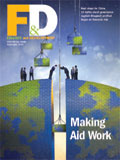 About F&D Subscribe Back Issues Write Us Copyright Information Free Email Notification Receive emails when we post new
items of interest to you. |
The aid puzzle At the Group of Eight summit in Gleneagles, Scotland, in July, the major industrial nations promised to significantly boost aid for developing countries—including doubling aid to Africa—in the hopes of helping poor countries reach the UN Millennium Development Goals (MDGs) by the 2015 target date. But will markedly higher aid levels really do much to "make poverty history" as aid campaigners have argued? Are expectations being unduly raised? After all, foreign aid as a development tool is nothing new, and its record over the past 40 years has been anything but encouraging. For the September issue of F&D, we invited aid experts, donors, and recipients to explore the questions that are front and center in development circles. What can be done to ensure that higher aid promotes growth and reduces poverty? How can policymakers in recipient countries improve the delivery of government services and infrastructure investments, along with managing spending decisions, when a large proportion of financing (aid) will be outside their control? How can donors ensure that their aid flows are less volatile and more predictable? And how can recipient countries prevent aid from causing currency appreciations or domestic inflation that would undercut their international competitiveness? The general consensus seems to be that scaling up aid flows will be just the start of a complex set of decisions and tough choices, requiring a truly global partnership—of recipients and donors and international financial institutions. Not surprisingly, some observers are more optimistic than others as to whether this will occur and thus how recipient countries will fare. * * * * * In "People in Economics," we profile Jagdish Bhagwati, a leading economist in the area of trade and development and a tireless advocate of free trade, which, along with governance, is viewed in development circles as essential for foreign aid to be effective in enabling poor countries to lift themselves out of poverty. In years past, he successfully tangled with die-hard Indian protectionists and Japan-bashers, and more recently, he has taken on the opponents of globalization. "When you choose to fight for free trade," says Bhagwati, "you sign on for life. Like Jaws in James Bond films, protectionism rises again and again, taking ever-new forms." In "Back to Basics," we look at another piece of the aid puzzle: governance and corruption. With donors expected to boost aid, especially for satisfactory performers—and a track record of good governance being a critical element—we wondered where policymakers might want to focus their energies. We learn that to date, anticorruption efforts haven’t worked well, largely because countries have ignored key governance reforms. The good news is that initiatives to encourage transparency, from press freedom to public disclosure of key political and economic information, could really make a difference. For that reason, the World Bank Institute is designing a transparency reform scorecard and constructing a transparency index, which will complement its well-known governance indicators. Laura Wallace
|